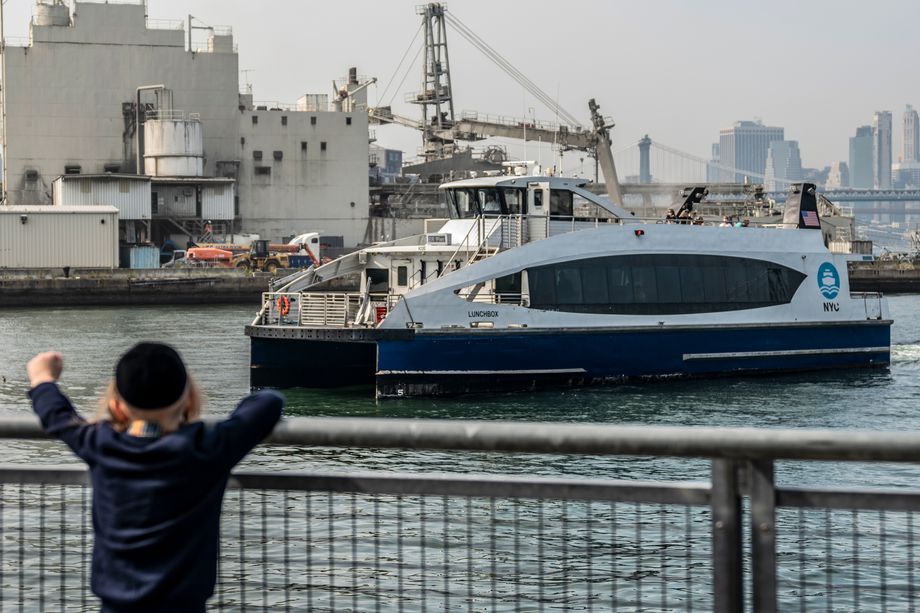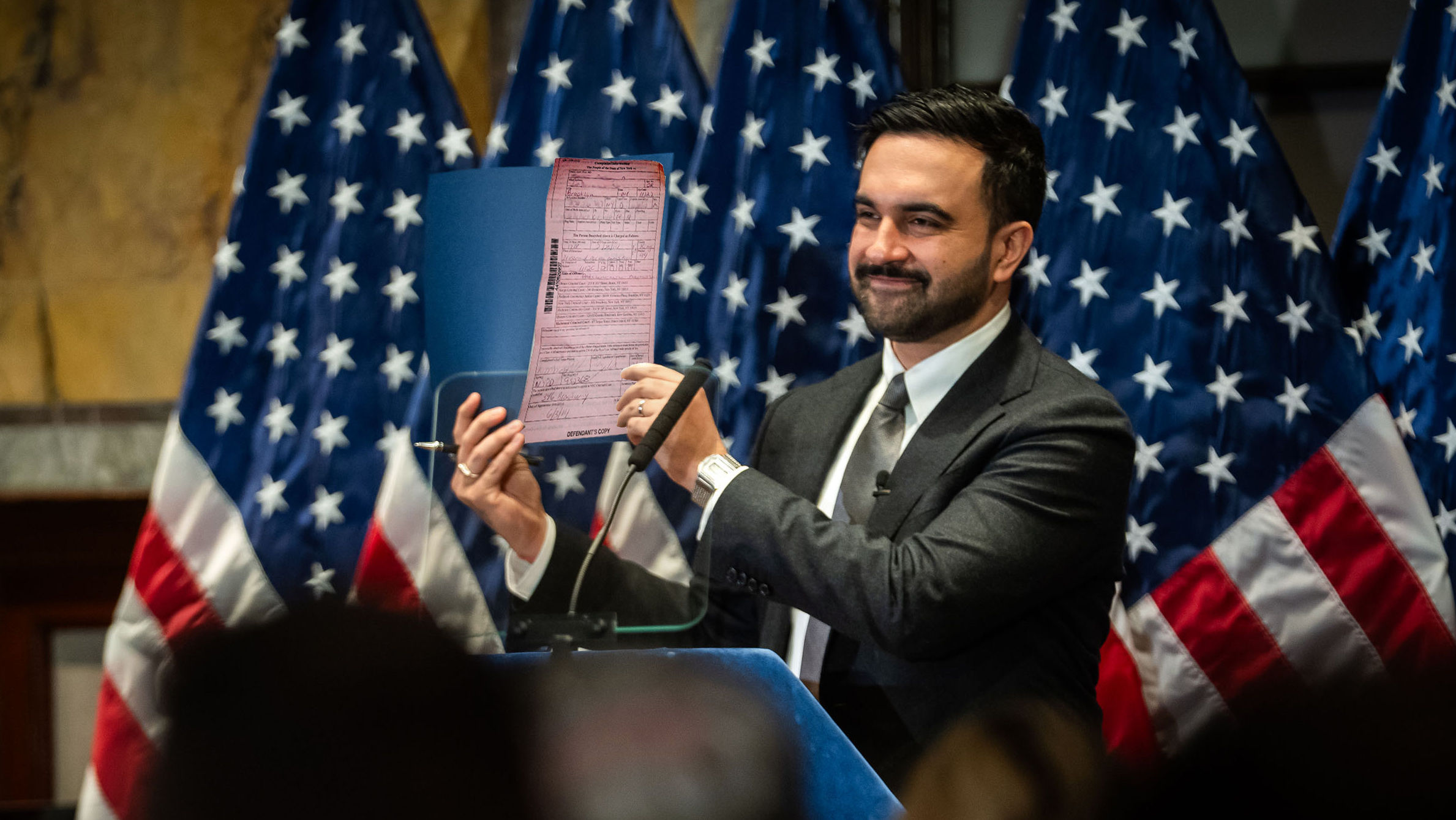This article was originally published on Sep 29 by THE CITY. Sign up here to get the latest stories from THE CITY delivered to you each morning.
The NYC Economic Development Corp. sent $28 million to city coffers last fiscal year — a fraction of the proceeds passed along before costly boat service launched.
The mayorally controlled city Economic Development Corporation diverted tens of millions of dollars in rent receipts from publicly owned Times Square real estate holdings to help operate the costly NYC Ferry system, the corporation’s latest financial filings show.
Budget statements prepared for the EDC’s Wednesday morning board meeting show just $28 million in 42nd Street and other proceeds being sent to the city treasury for the fiscal year that ended June 30. That’s down from $125 million in 2014 and $103 million in 2016.
Mayor de Blasio launched NYC Ferry in 2017, heralding its arrival as “a new day for our city.”
A happy day today with @BilldeBlasio @DMAliciaGlen @NYCEDC @jbpatchett @CamJClark as we christened our first ferry! pic.twitter.com/2OKFLAOSpC
— NYC Ferry (@NYCferry) April 18, 2017
The ferry system racked up $53 million in net costs for EDC in fiscal year 2020, the new numbers indicate, as it did in 2019. The watchdog Citizens Budget Commission a year ago calculated that with passengers paying just $2.75 a ride, each ferry trip costs the government $9.34 a ride.
State Sen. John Liu (D-Queens), who as city comptroller slammed EDC in 2010 in an audit that found it had failed to deliver more than $125 million owed to city taxpayers, said he now believes EDC should be abolished — calling it “a slush fund for whoever runs City Hall.”
THE CITY recently reported that among those de Blasio has appointed to EDC’s board is Charlie Tebele, a donor to the mayor’s reelection campaign as well as his brief 2020 presidential run. Tebele also sold the city COVID protective gear under no-bid contracts.

The Citizens Budget Commission detailed the ferry-driven trend of falling EDC contributions to the city in a June blog post. It urged the corporation to rein in ferry costs amid the “extraordinary costs stemming from the city’s pandemic response.”
“In the coming months, EDC should continue to identify ways to make its ferry operations more efficient,” researcher Sean Campion wrote — including “delaying the launch of costly planned expansions.”
NYC Ferry is still scheduled to expand service next year, according to the website of operator Hornblower, adding routes connecting Coney Island with Wall Street and between Staten Island and Manhattan’s West Side.
Spending Into the Crisis
EDC, a nonprofit organization, has held on to 42nd Street rent income since 2017. It continued to do so even as coronavirus began to wreck city tax collections, the financial statements indicate.
EDC’s 42nd Street holdings — transferred to the city by the state nearly a decade following a transformative takeover of the once-seedy strip — include office towers, theaters and the building housing the Madame Tussaud’s wax museum. Another tenant, the Hilton Times Square, recently shut down.
In total, the city’s 42nd Street holdings brought EDC nearly $58 million in rent payments last year, the latest figures show.

The revelation that the ferry continues to soak up city dollars comes as schools and social services face stinging budget cuts. Meanwhile, de Blasio has asked many city workers to take furloughs as he warns of potential layoffs because of coronavirus economic shocks.
Liu noted that EDC’s retention of the 42nd Street rents and other dollars deprives the City Council of its power to decide on city spending at a time of pressing needs.
“The problem is that it’s not part of the budgeting process, it’s a unilateral decision on the part of the mayor, just to keep one of his pet projects afloat,” said Liu.
“It’s an end-run around a democratic process, and it’s outlived its usefulness.”
Separate Bill for $82M in Boats
The $53 million a year to prop up ferry operations does not include the cost of acquiring the boats, which the city is absorbing in its capital plan. EDC committed to purchase the entire ferry fleet from operator Hornblower despite a cheaper rental plan from other bidders to run the ferry service.
Current city Comptroller Scott Stringer flagged a deal for NYC Ferry vessel purchases as the biggest contract signed by EDC in the past year, totaling $82 million.
Stringer said the latest numbers showing deep city spending on the ferries cannot be sustained during a financial crisis — and also pointed to survey data showing ferry riders are disproportionately white and high-income.
The ferries require a separate fare from the city subway and bus system, and does not accept free transfers or reduced-fare MetroCards.
“New Yorkers deserve a range of transportation options to safely travel throughout our city, but that cannot come at the expense of accountability and fiscal responsibility,” Stringer said in a statement. “As our city battles a financial crisis and the mayor threatens frontline workers and essential services, I seriously question sending millions of dollars to buoy NYC Ferry.”
THE CITY is an independent, nonprofit news outlet dedicated to hard-hitting reporting that serves the people of New York.







